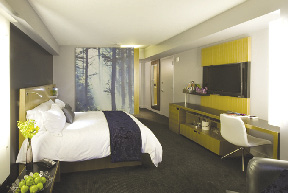A dozen years ago the "Made in the U.S.A." position of U.S.A. commercial consumers in the hotel industry was replaced simply by the availability of product from other countries, built with similar or better quality at a lower price. It was fast and drastic. Lower labor costs, a global market for raw materials, and the international market for high quality automation, machinery and expertise allowed other countries to produce materials that were economically attractive to the end users here in the United States. China was a major player. Extremely low labor costs and a willing government to subsidize company growth allowed manufacturing companies to sell to U.S. distributors for prices that, despite the cost of freight, logistics, and tariffs, were lower than American made. Architectural stone, wood furniture, lighting, fabrics, woven wool carpets, and other items were made so inexpensively in Asia that it allowed properties to upgrade their quality at the same cost, or less, as previously lesser quality product. We all remember when the choice for vanity tops in guest bathrooms was laminate, with an upgrade to engineered solid surface, and finally to have marble or granite for the luxury look. Granite and marble from China became lower in price than solid surface and on par with laminate and three star properties began installing upgraded materials. American and Canadian furniture companies began moving production to China, or risked going out of business. There were concerns about quality issues with China, but it is very important to point out that as just as USA does not necessarily stand for quality overall, China does not mean that all manufacturing is good or bad. Generalizing is dangerous. All manufacturers should be qualified, due diligence performed and their standards vetted. Although some countries and regions have higher quality standards overall, there are good and bad manufacturers everywhere. I remember the first time I took samples of nightstands, one from a Chinese manufacturer and one from an American manufacturer to a client who advised he was adamant that he wanted to buy US made furniture. He looked at both nightstands and standing over the obviously superior Chinese made piece asked "How much more do I have to spend to get this furniture?" I informed him that he would save 15% including freight to get the superior product. The old reasons for buying US made meant better quality, loyalty, patriotism, and lower risk. The advantages of the imported product began to outweigh those reasons. As a consultant to our clients it is our responsibility to provide the quantitative and qualitative options that benefit them.
Adding to the intrigue, China was hit with very high anti-dumping tariffs around 2003 that affected some categories of furniture and a new element of risk entered the industry. Geo-political risk. That risk continues to increase and since 2008 we must weave in global economic risk, a currently rising currency value against the dollar, increased freight and logistics cost and the decision tree gets more complicated. Fast forward to the present and let's add more criteria to the analysis. Product providers must now communicate to an increasingly informed end consumer their practice in sustainability and social conscience. Supply chain analysis, carbon foot prints, eco friendly behavior on the corporate and individual level are becoming extremely important issues that, despite the short term premium, can result in long term benefits for the hotel owner. Social media is a major force in connecting information rating performance of product. Information passes quickly, and although the accuracy of that information may come into question, it makes companies take extreme care in their quality, image and corporate communication. It is a hopeful time to bring manufacturing back to the United States and create a win-all situation for reducing carbon footprint. Whether or not you are a free trade proponent, getting companies to improve quality, social consciousness and global competitiveness, no matter what country they are from, is good for this planet. And what is good for this planet, is good for us.
Here are examples of current manufacturing stories. Sleep Inc. is a new player in hospitality bedding manufactured in the U.S. with excellent quality and sustainable materials. 99% of old mattress and box spring materials are recycled back into other products at a facility in Texas and they will pick up and ship old beds within the prices they quote. 60 Minutes aired a show in the 90's exposing bed manufacturers' who drastically overstated actual materials used to boost the bottom line of their profit margins. Sleep Inc. attaches an "ingredients" label and warranty to every bed to confirm the exact materials used. Sleep Inc. is a refreshing return to great product, fair price and social conscience.
International Furnishings (IF) is a U.S. based casegood company using a manufacturer that combines traditional Amish craftsmanship combined with current high technology machinery. Instead of formaldehyde fabricated medium density board for base materials, IF is using high grade plywood achieving a higher quality product very close to imported prices. By the time the analysis of price, shipping, risk mitigation, and controlled installation was completed it was an easy decision for owners to use IF on two prestigious hotel properties currently renovating in Palm Beach and Hanover, N.H.
The frequency of change in all aspects of technology, demand, manufacturing, and consumer behavior is going to increase. Manufacturing technology will continue to improve and change the dynamics of competing industries. Local and sustainable raw materials, local industry, reduced carbon footprint from a responsible supply chain will help hotel owners tell their story to their guests that can create a positive impact in many ways. Our obligation as a procurement consultant to hotel owners is to provide them with options and accurate criteria to make their buying decisions. We are pleased to see that the criteria for making decisions on U.S. made product is swinging back to the positive.
Gus Sarff, ISHC is president and owner of GS Associates, Inc., a procurement consulting firm providing FF&E and OS&E services locally, nationally and globally for luxury, convention, resort, limited service hotels, fractional ownership properties, restaurants, and function facilities. For over 25 years, GS Associates, Inc. has continued to develop procurement technology and creative sourcing to maintain its leadership in the industry. GSA's services are transparent, expert, and will make a positive impact on any project.
For more information please visit www.gsa-inc.com or send email inquiries to Gus Sarff at gus@gsa-inc.com.
Tags:
Gus Sarff - Buying U.S. made furnishings and interior finishes - Is it time to come home?
July 12, 2011 - Front Section











